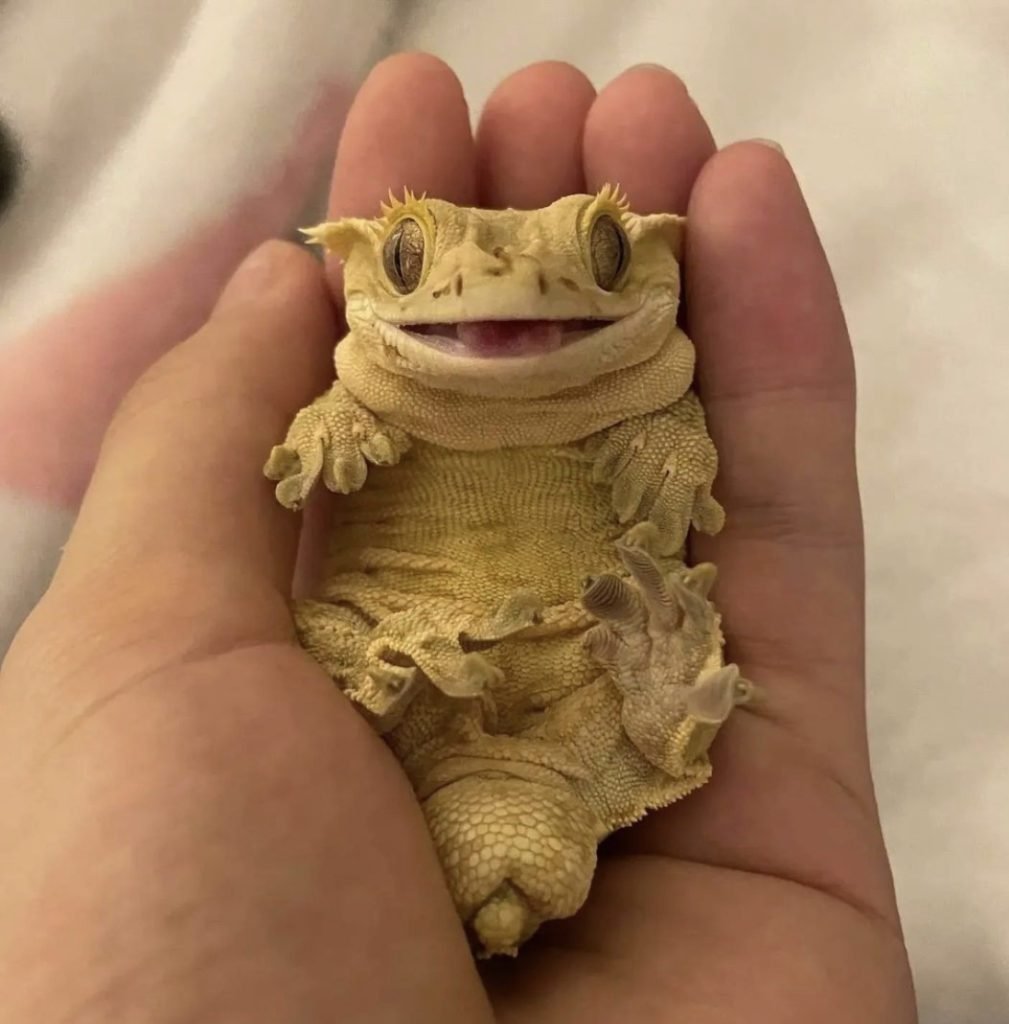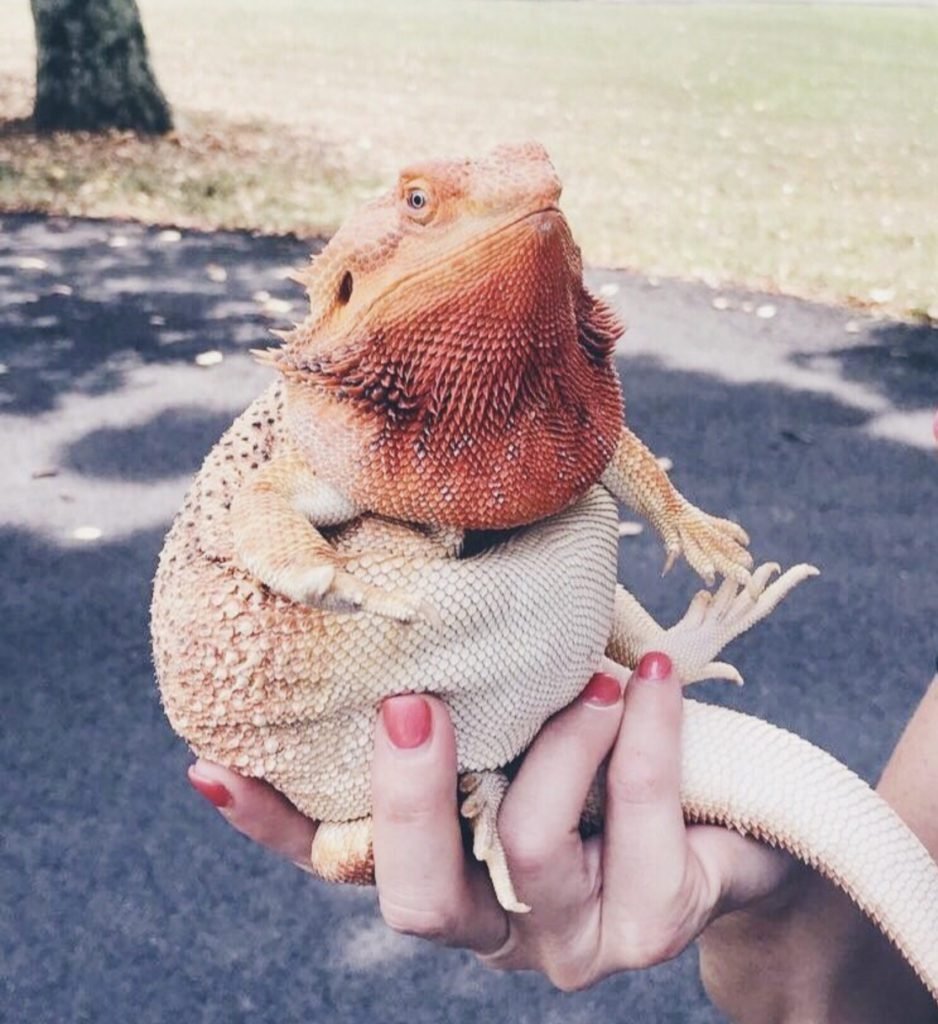Bearded dragon facts are fascinating, and we’ve gathered the top 16 for you to explore. From their unique personalities to impressive lifespans, these incredible reptiles will surprise and delight you. Whether you’re a new pet owner or simply interested in these fantastic creatures, our article has everything you need to know. Discover the secrets of bearded dragons today!
1. Do bearded dragons play dead?
Bearded dragons may use “playing dead” as a defensive strategy, which is not typical for the species. However, it’s important to note that this behavior may indicate a stressed or fearful lizard, so it’s not something to be encouraged or taken lightly.
2. Do bearded dragons need a red light at night?
Bearded dragons do not require a red light at night. Red lights can disrupt their natural sleep cycles and decrease overall health. Use a ceramic heat emitter or a white light with subtle power for more heat.

You may also interest: Discovering the Menu: What Do Bearded Dragons Eat?
3. Bearded dragon's lifespan
Bearded dragons’ lifespans depend on genetics, nutrition, habitat, and care. In captivity, bearded dragons live 10–15 years. Bearded dragons could live to 20 with adequate healthcare and food.
A bearded dragon’s lifespans depend on several things. Poor nutrition and shelter can cause health issues and shorten lifespans. To guarantee a long and healthy life, your bearded dragon needs balanced food, an appropriate living habitat, and proper care.
4. Are bearded dragons social?
Bearded dragons aren’t friendly, but they can bond with their owners. They may benefit from living with another bearded dragon of a similar size and gender. However, monitoring their behavior and interactions is essential to ensure that they are not aggressive toward each other.
5. Can bearded dragons eat broccoli?
Bearded dragons are omnivores and may eat broccoli in moderation. That’s because it contains goitrogens, which can interfere with the absorption of iodine in their diet and lead to thyroid problems if consumed in excess. However, as long as you don’t overdo it, broccoli can provide a nutritious addition to the diet.
6. How smart are bearded dragons?
In general, bearded dragons do not get high marks for intelligence. They’re indeed capable of a wide variety of mind-blowing feats. They can learn, solve problems, and even have social cognition. Understanding that reptiles’ intelligence can vary according to age, environment, and genetics is vital.

7. Fat bearded dragons
Like all other animals, bearded dragons can get too fat if they don’t get the care and attention they need. Bearded dragons can get obese from a high-fat, sugary diet and lack of exercise. It’s crucial to monitor their weight and adjust their diet and activity levels accordingly to maintain a healthy body.
8. Do bearded dragons pee?
The process of urination in bearded dragons is very different from that of mammals. Instead, they excrete uric acid, a solid waste product expelled along with their feces. It’s essential to keep their enclosure clean and provide them with plenty of fresh water to help flush out these waste products and keep them healthy.
9. Why do bearded dragons flatten out?
Bearded dragons flatten out for a variety of reasons, but one of the most common is to regulate their body temperature. By spreading out their bodies, they can increase the surface area exposed to the sun or heat source, allowing them to absorb more warmth. They may flatten when frightened or show hostility to look larger and scarier to predators.
10. Do bearded dragons know their name?
While bearded dragons may not understand their names as we do, they can learn to recognize certain sounds or tones associated with specific individuals. They may also respond to training orders like being hand-fed or placed in a particular cage spot. However, it’s important to remember they are not domesticated animals, and their responses may vary based on their temperament.
11. Can bearded dragons regrow their tails?
Tails lost by bearded dragons due to injury, or self-defense can be grown again. However, the regenerated tail may look different from the original and will likely be shorter and more functional. It’s also important to note that regrowing a tail requires a lot of energy and can be stressful for the Bearded Dragon. So it’s best to prevent tail loss in the first place by providing a safe and secure environment for your scaly friend.
12. Can bearded dragons eat celery?
Another Bearded dragon facts can eat celery as a part of a balanced diet, but it’s important to remember that it’s not the most nutritious food for them. Celery is high in water and fiber but doesn’t offer many vitamins and minerals. However, incorporating it into their diet in moderation is still beneficial.
13. Dig box for bearded dragons?
A dig box can be a fantastic addition to a bearded dragon’s enclosure. Usually filled with soil and sand, these boxes provide a natural and stimulating environment for the lizard to dig and burrow in. That can help satisfy their instincts and keep them mentally and physically engaged.

14. Are super worms good for bearded dragons?
There are better food choices than super worms for bearded dragons. They’re heavy in protein, fat, and phosphorus, which can hurt reptiles if they overeat. For adequate nutrition, they should eat insects, veggies, and fruits.
15. Bearded dragons nails
Bearded dragons’ nails can grow quite long if trimmed sparingly. Overgrown nails can lead to discomfort and even injury to the lizard’s feet, so it’s essential to keep them cut to an appropriate length. Using reptile nail clippers or getting the reptile to a doctor or professional reptile keeper can handle this.
16. How long can bearded dragons go without UVB?
To end this list of Bearded Dragon Facts they need 10–12 hours of UVB sun daily to keep healthy. Without UVB, they can develop various health problems, including metabolic bone disease. It’s best to ensure they have access to UVB light regularly to keep them healthy and thriving.

